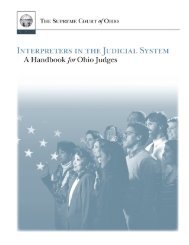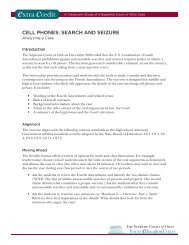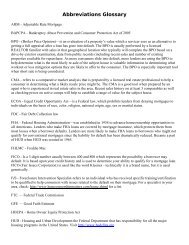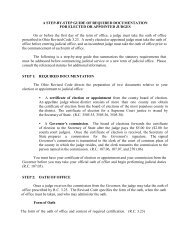Planning for Parenting Time: Ohio's Guide for Parents Living Apart
Planning for Parenting Time: Ohio's Guide for Parents Living Apart
Planning for Parenting Time: Ohio's Guide for Parents Living Apart
You also want an ePaper? Increase the reach of your titles
YUMPU automatically turns print PDFs into web optimized ePapers that Google loves.
Long-Distance <strong>Parenting</strong> and Relocation<br />
AGE-SPECIFIC RECOMENDATIONS<br />
BIRTH TO PRE-SCHOOL<br />
This is an important time <strong>for</strong> bonding between parents and children. For<br />
most children, the loss of a strong bond is a lifelong issue. In contrast,<br />
building a strong bond creates a sense of belonging, encourages active<br />
and committed parents, causes healthy adult relationships with both<br />
genders and improves communication between parents and a growing<br />
child. If possible, the long-distance separation should be delayed so both<br />
parents and children can make the best use of their time together during<br />
these <strong>for</strong>mative years. If the move cannot be delayed, the schedule<br />
should be designed to provide the most direct and frequent physical<br />
contact between the child and both parents that time and money permit.<br />
KINDERGARTEN TO 12 YEARS<br />
The parties should continue to make the most of the time each parent has<br />
with the child. The schedule should be adjusted to follow the child’s<br />
regular school schedule. The school-year parent must sacrifice frequent<br />
physical contact during non-school times, such as the summer and<br />
holidays, while the non-school parent must sacrifice frequent physical<br />
contact during the school semesters. Some schools have year-round or<br />
modified year-round schedules that provide <strong>for</strong> more frequent or longer<br />
breaks with the distant parent. It would assist children if parents can find<br />
a school with such a schedule.<br />
13 TO 15 YEARS<br />
The parties should continue to take full advantage of the time each parent<br />
has with the teen. The schedule should continue to follow closely the<br />
available times from the teen’s school schedule. The distant parent may<br />
need to accommodate the school schedule and extracurricular activities.<br />
The school parent may need to sacrifice holiday time to offset the<br />
parenting time lost by the distant parent. Weekend parenting time may<br />
become more difficult during the school year because of the teen’s<br />
involvement with school activities, work and friends. Flexibility by both<br />
parents is critical. <strong>Parents</strong> can expect the teen to try to negotiate time<br />
with both parents. Consider your teenager’s ideas in your decisionmaking.<br />
Expect that some teens may want to switch hometowns <strong>for</strong> the<br />
opportunity to get to know the other parent better. As with any schedule,<br />
parents must make the final decision about schedules. Summer parenting<br />
time is even more important to ensure that the distant parent and teen<br />
have a continuing relationship. The distant parent should make every<br />
ef<strong>for</strong>t to provide matching activities, summer-school classes or<br />
60
















